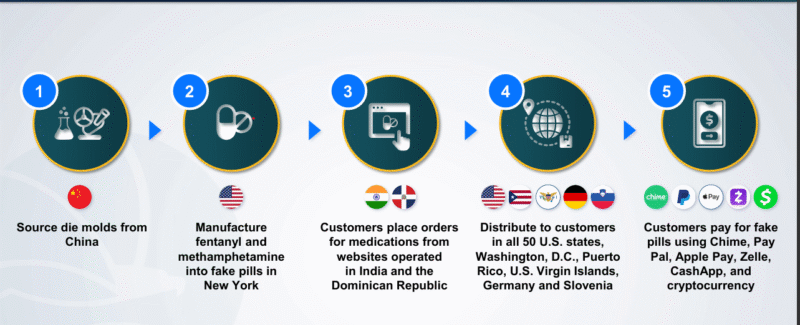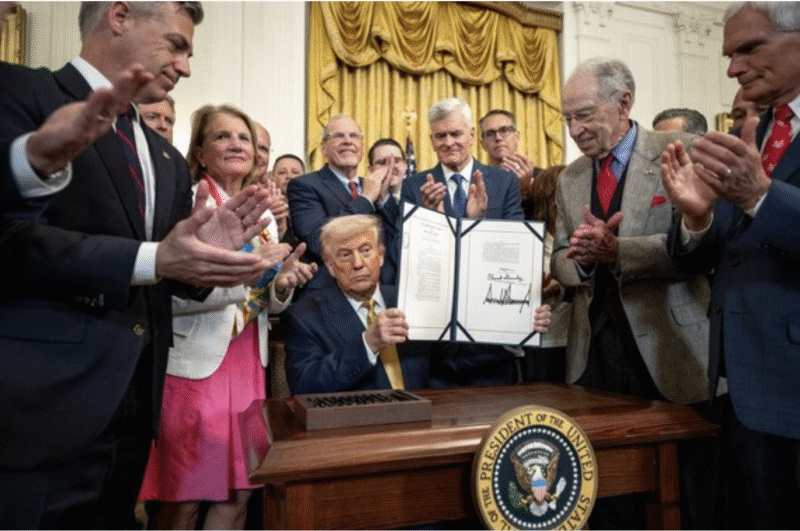As students return around the country this fall for a fresh semester on campus, public health officials warn parents and the public of the dangers posed by fentanyl and online pharmacies selling counterfeit prescriptions. The risks of overdose from pills laced with fentanyl and methamphetamine to unsuspecting victims have become a deadly reality.
After the death of an American who passed away after accidentally consuming counterfeit medication in September of 2024, the DEA aggressively began an investigation into these pill mills through operation Press Your Luck to combat the threat of online, often foreign-based, pharmacies targeting American consumers. Law enforcement has since seized more than 357,000 deadly doses of fentanyl in Iowa since January alone.
DEA testing has found that almost half of all counterfeit pills they seized with fentanyl contained a lethal dose. Meaning many who order from these contaminated sources or think they are taking licensed prescriptions are at risk of overdose on first use.

Many of these sites purport to be legitimate, U.S.-based, or FDA-approved sites, but are actually working with drug traffickers to fulfill online orders with fake pills. These website operators are going to great lengths to make the websites look like legitimate online pharmacies – offering 24-hour customer service, posting online reviews and safety facts, and offering deep discounts to deceive customers into believing they were buying from a reputable business.
Sites currently identified as selling counterfeits include
- www.Curecog.com
- www.Pharmacystoresonline.com
- www.Careonlinestore.com
- www.yourphamacy.online
- www.MD724.com
- www.Greenleafdispensarystore.com
- www.Whatishydrocodone.weebly.com
- www.Orderpainkillersonline.com
- www.USAMedstores.com
Drug traffickers can advertise on social media platforms like Facebook, Instagram, Snapchat, TikTok, Twitter, and YouTube. These advertisements are in disappearing, 24-hour stories and in posts, which are promptly posted and removed. Once contact is made, drug traffickers and potential buyers often move to an encrypted communications app like WhatsApp, Signal, and Telegram.
Fentanyl has become responsible for 70% of overdose deaths in the US and is the leading cause of death for people between the ages of 18 and 45.

“For parents, talk to your children early, at a young age,” said special agent Travis Ocken of the DEA’s Omaha Division: “Don’t shelter them so they don’t hear about this information. As parents, we want our children to be able to come to us with questions and know someone is there supporting them. If young adults don’t feel comfortable coming to us as parents to learn the true dangers, they’re going to go somewhere else. Whether it’s TV, friends, or social media, it’s often glamorized”.
Signs a seller may be suspicious include
- Sells prescription drugs without requiring a valid prescription from a healthcare provider
- Offers much cheaper prices than what is typically seen in the market
- Lists prices in a foreign currency
- Does not contain proof of a valid pharmacy state license or DEA registration
- Medicine arrives in broken or damaged packaging or in a foreign language
- Medicine does not have an expiration date or is expired
Strides in Naloxone technology and accessibility have been a huge asset to communities combating overdose deaths; down almost 20% since 2024. Naloxone displaces the opioid molecules from the brain’s receptors and reverses the respiratory depression caused by an overdose within two to eight minutes. State and local programs have begun offering free Narcan in offices and vending machines, including in Johnson County as of last August.

However, how lawmakers and institutions should approach the opioid crisis still poses an uncomfortable debate for many, especially in Iowa’s legislature, where bills advocating harm reduction and decriminalizing fentanyl test strips have been repeatedly introduced and failed to pass. Under current law, the paper test strips used to detect trace amounts of fentanyl, xylazine, or analog alterations are classified as “drug paraphernalia” and warrant a simple misdemeanor.
In July, Sen Chuck Grassley introduced and successfully passed the Fentanyl HALT Act, which permanently extends the 2018 order classifying fentanyl as a Schedule 1 drug, allowing greater enforcement authority and harsher punishments for offenders. Since then, a myriad of arrests and long sentences have been issued, in line with headwinds toward a tougher on crime approach and away from increasingly unpopular harm reduction methods, such as in Oregon.
The CDC and DEA advise parents and community members seeking more information about available resources and preventing overdoses to visit One Pill Can Kill | DEA.gov.





